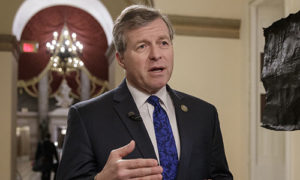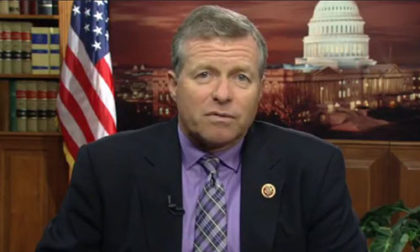Rep. Charlie Dent, Who Wants to Eradicate Online Poker, Resigning from Congress Early
In September 2017, one of online poker’s foes in Washington, D.C. announced that he was not going to seek re-election and I cheered. This week, Representative Charlie Dent (R – PA) decided that he isn’t even going to wait until January 3rd, the day his term is to end, to call it a day. Instead, Dent has announced that he will resign “in the coming weeks.” Bye.
In a brief statement on his Congressional website, Rep. Dent said:
After discussions with my family and careful reflection, I have decided to leave Congress in the coming weeks. Serving the people of the 15th Congressional district has been a tremendous responsibility and the privilege of a lifetime, and I am honored by the trust that so many of my constituents placed in me to represent them in Washington. Actively engaging in the legislative and political process presents challenges, and in so doing, I believe I have had a positive impact on people’s lives and made a difference in Congress.
I am especially proud of the work I have done to give voice to the sensible center in our country that is often overlooked or ignored. It is my intention to continue to aggressively advocate for responsible governance and pragmatic solutions in the coming years.
 “Sensible center…” okay? Somehow, Rep. Dent is the co-chair of the Tuesday Caucus, a group of around 50 moderate Republicans formed in 1994 to try to bring the Republican party more to the center, as it had been sliding ever-right. I don’t think it’s working.
“Sensible center…” okay? Somehow, Rep. Dent is the co-chair of the Tuesday Caucus, a group of around 50 moderate Republicans formed in 1994 to try to bring the Republican party more to the center, as it had been sliding ever-right. I don’t think it’s working.
In the meantime, when it comes to online poker, Rep. Dent is ultra-conservative and has engaged in sneaky political practices that the right wing of Congress loves to employ. Rewinding to late 2011, the Department of Justice’s Office of Legal Counsel (OLC), after a couple states requested its opinion, issued a clarification of the Wire Act of 1961, saying that it only outlawed sports betting. Prior to the clarification, the DoJ had interpreted the Wire Act to make all online gambling, including poker, illegal.
Of course, this spurred Las Vegas Sands CEO and billionaire Republican donor, Sheldon Adelson, into action, as he and his cronies penned the Restoration of America’s Wire Act (RAWA), a bill which aims to make the previous, incorrect interpretation of the Wire Act law. He got Rep. Jason Chaffetz (R – Utah) and Senator Lindsey Graham (R – S.C.) to introduce the bill, but aside from a couple of joke hearings in front of Rep. Chaffetz’s committee, nothing much happened with RAWA.
Which brings us back to Rep. Charlie Dent. Dent, whose state had been working to legalize online gambling (and it has, with online poker rooms probably launching this year), wanted RAWA to happen, but instead of introducing the bill again, he tried an end-around in 2016. Rep. Dent attached RAWA-like language onto an Appropriations bill in the House. Here is how it read:
The Memorandum Opinion for the Assistant Attorney General, Criminal Division, dated September 20, 2011, and pertaining to the lawfulness of proposals by Illinois and New York to use the Internet and out-of-state transaction processors to sell lottery tickets to in-state adults (including the applicability of the Wire Act (18 U.S.C. 1084) and the Unlawful Internet Gambling Enforcement Act (31 U.S.C. 5361–5367) to such proposal), does not carry the force of law and shall have no force and effect for purposes of interpreting or applying section 5362(a)(10) of title 31, United States Code.
Fortunately, there were enough reasonable Representatives who saw the bullshit Rep. Dent was trying to pull and let him know it wasn’t going to happen. He still introduced the amendment and withdrew it, probably to avoid the total embarrassment of giving up completely.
Word was that Rep. Dent was going to try the same thing again in 2017, but it doesn’t sound like he ever did so. Former Congressman Ron Paul went off on him in an op-ed for PennLive.com for just considering a second attempt.
“The fact that supporters of the online gaming ban are trying to sneak it onto an appropriations bill suggests that they know that the arguments for banning online gaming cannot stand up to public scurrility [sic],” Paul said. “Otherwise, they would work to have their bill considered under regular order with a full and fair debate.”
He continued spitting hot fire, adding:
Sneaking this bill onto the Appropriations bill is exactly the type of political “trick play” that has made so many Americans disgusted with Congress. This is especially so given that it is an open secret that much of the support for this bill comes from one billionaire caisson owner who is also one of the country’s largest political donors. No wonder a federal ban on online gaming is opposed by political figures from across the political spectrum, from libertarians like myself to progressives like Barney Frank.
So yeah, see ya, Charlie.



















COMMENTS